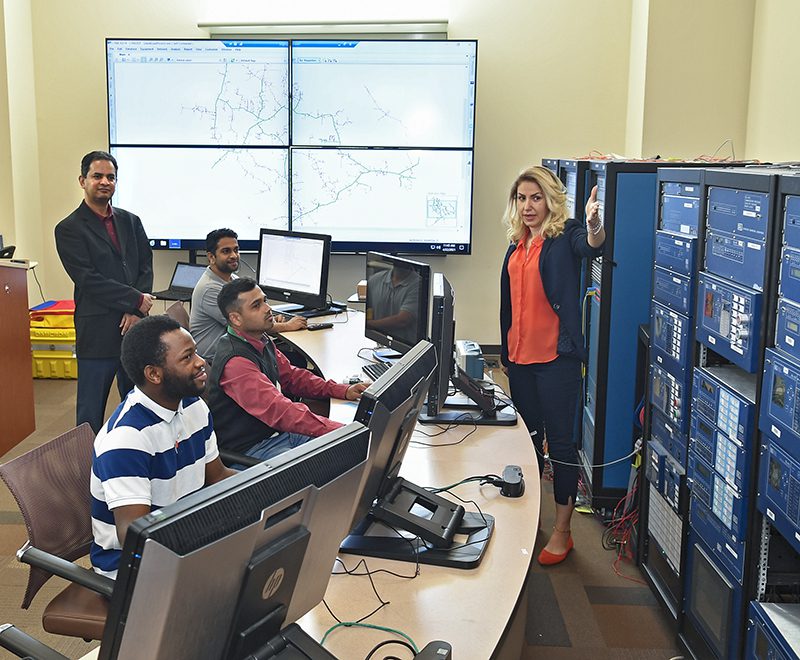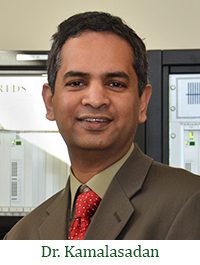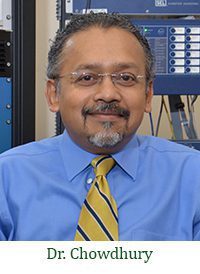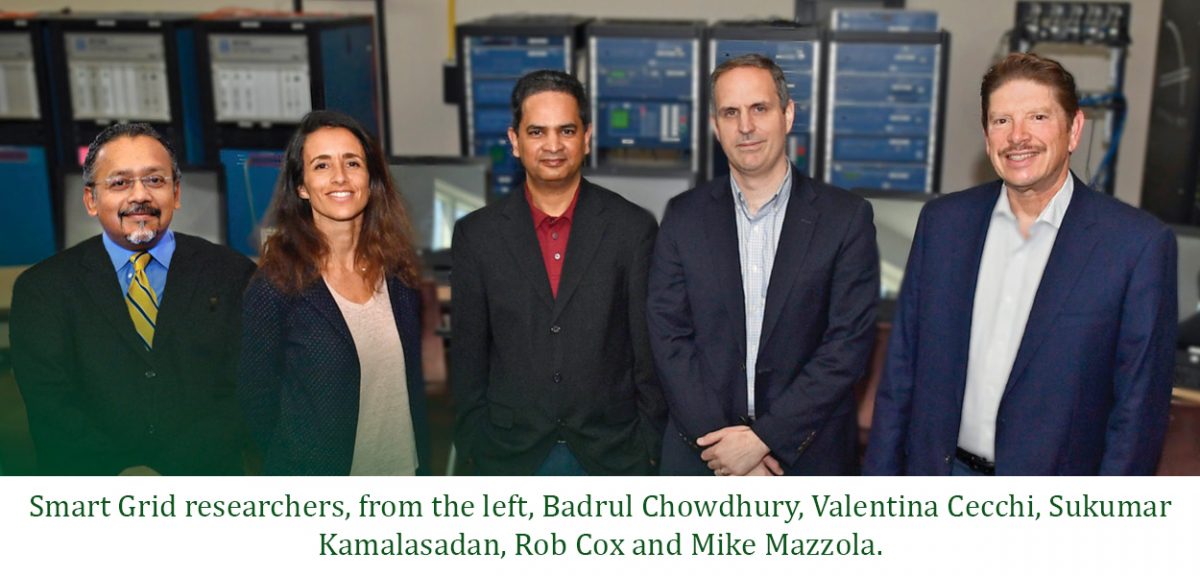UNC Charlotte Smart Grid Lab Getting Smarter

Created to educate the next generation of electrical power distribution engineers and to advance research into integrating renewable power into the grid, UNC Charlotte’s Duke Energy Smart Grid Laboratory has been fulfilling its mission since 2012. Partnering with utilities, universities and governmental agencies, the momentum of laboratory researchers has been increasing in the past two years with a number of new projects, including two major research grants from the U.S. Department of Energy Solar Energy Technologies Office (SETO) totaling more than $8 million.
Throughout the life of the Smart Grid Lab, Duke Energy has provided financial support and research expertise to advance the study of power distribution and forecasting. Students from UNC Charlotte’s W.S. Lee College of Engineering who were trained in the lab have now gone on to work for Duke Energy, and are part of ongoing research collaborations between the utility and the university.
 The Smart Grid Lab is part of UNC Charlotte’s Energy Production and Infrastructure Center (EPIC). “The Smart Grid Lab is a resource that allows us to build research expertise, and educate undergraduate and graduate students who are now leaders in our partnering companies,” said Dr. Mike Mazzola, Executive Director of EPIC. “Since 2018, the lab has been advancing much of its previous research to full demonstration modes, which has been the purpose of the lab from the very start. The Smart Grid Lab is at the heart of two major grants we have won in the past two years.”
The Smart Grid Lab is part of UNC Charlotte’s Energy Production and Infrastructure Center (EPIC). “The Smart Grid Lab is a resource that allows us to build research expertise, and educate undergraduate and graduate students who are now leaders in our partnering companies,” said Dr. Mike Mazzola, Executive Director of EPIC. “Since 2018, the lab has been advancing much of its previous research to full demonstration modes, which has been the purpose of the lab from the very start. The Smart Grid Lab is at the heart of two major grants we have won in the past two years.”
 In 2020, SETO awarded $4.6 million to UNC Charlotte Electrical and Computer Engineering Professor Dr. Sukumar Kamalasadan for the project “Optimal Reconfiguration and Resilient Control Framework for Real-Time Photovoltaic Dispatch to Manage Critical Infrastructure.” The purpose of the project is to advance solar energy’s role in strengthening the resilience of the U.S. electricity grid. The project is developing a grid management tool that detects cyber and physical threats, and forms dynamic clusters to optimally manage photovoltaics and energy storage.
In 2020, SETO awarded $4.6 million to UNC Charlotte Electrical and Computer Engineering Professor Dr. Sukumar Kamalasadan for the project “Optimal Reconfiguration and Resilient Control Framework for Real-Time Photovoltaic Dispatch to Manage Critical Infrastructure.” The purpose of the project is to advance solar energy’s role in strengthening the resilience of the U.S. electricity grid. The project is developing a grid management tool that detects cyber and physical threats, and forms dynamic clusters to optimally manage photovoltaics and energy storage.
 In 2021, SETO awarded a $3.6 million grant to improve the resilience and reliability of the regional electrical grid. Dr. Badrul Chowdhury, who holds a joint position as professor in the Electrical and Computer Engineering Department and the Systems Engineering and Engineering Management Department, is the principal investigator. The project, one of 10 chosen nationwide and the only one in North Carolina, is part of a collaborative effort among state government, utility companies, industry and universities to develop an advanced microgrid control architecture. The research will seamlessly coordinate microgrids with the bulk power grid at multiple points, automatically balancing load and generation while safely providing critical services. The proposed control architecture will be tested using a unique digital-twin approach, which will have direct, real-time connections between laboratories and microgrids. A field demonstration at Duke Energy’s Hot Springs microgrid is planned.
In 2021, SETO awarded a $3.6 million grant to improve the resilience and reliability of the regional electrical grid. Dr. Badrul Chowdhury, who holds a joint position as professor in the Electrical and Computer Engineering Department and the Systems Engineering and Engineering Management Department, is the principal investigator. The project, one of 10 chosen nationwide and the only one in North Carolina, is part of a collaborative effort among state government, utility companies, industry and universities to develop an advanced microgrid control architecture. The research will seamlessly coordinate microgrids with the bulk power grid at multiple points, automatically balancing load and generation while safely providing critical services. The proposed control architecture will be tested using a unique digital-twin approach, which will have direct, real-time connections between laboratories and microgrids. A field demonstration at Duke Energy’s Hot Springs microgrid is planned.
Other ongoing projects in the Smart Grid Lab include:
- Distributed Energy Storage and EV Holding Capacity with Value Proposition Development = $90,000
- Comparative Power Flow Analysis and Power Flow Quality Criteria – Phase I = $45,000
Comparative Power Flow Analysis and Power Flow Quality Criteria – Phase II = $45,000 - Identification, and Mitigation of Coordinated Attacks on Distributed Energy Management = $90,000
- Developing a Combined System Model and Simulation Process for Integrated Planning and Operations across Transmission and Distribution Systems = $200,000
- Planning an Affordable, Resilient, and Sustainable Grid in North Carolina = $201,000

